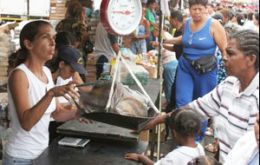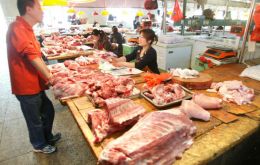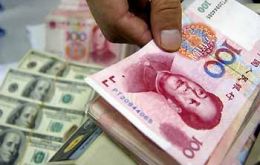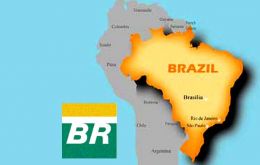MercoPress. South Atlantic News Agency
Economy
-
Friday, March 12th 2010 - 01:14 UTC
Brazilian economy contracted 0.2% last year but is poised to expand 5.7% in 2010

The Brazilian economy contracted for the first time in 17 years in 2009, falling by 0.2% the Brazilian Institute of Geography and Statistics (IBGE) said Thursday. It was the first annual contraction of GDP since 1992. IBGE said the industrial and agricultural sectors were hit hardest but the services sector gained in 2009
-
Friday, March 12th 2010 - 01:03 UTC
Forbes list includes 36 Latinamericans with fortunes above a billion dollars

A total of 36 Latinamericans figure in the Forbes list of men with fortunes greater than a billion dollars, like the Mexican Carlos Slim, the new Chilean President Sebastián Piñera, and the Brazilian Eike Batista, as well as drug lord Joaquín Guzmán Loera, “El Chapo,” informed Forbes magazine.
-
Friday, March 12th 2010 - 00:08 UTC
“God is Bolivarian” and will bring rain to Venezuela’s power stations, says Chavez

Venezuelan president Hugo Chavez faces a major power shortage that could severely damage the country’s economy and plunge his popularity, but he is confident sufficient rainfall is on the way to fill the lake of a crucial dam because “God is Bolivarian”.
-
Friday, March 12th 2010 - 00:00 UTC
February inflation in China anticipates further tightening of credit

Chinese inflation hit a 16-month high in February, causing economists to call for the government to tighten the economy to prevent overheating. The annual rate of consumer price inflation rose to 2.7% in February, up from 1.5% in January, and ahead of analysts' expectations of 2.3%.
-
Thursday, March 11th 2010 - 23:59 UTC
US February budget deficit was the largest in history: 221 billion USD

The US government recorded a budget deficit of 221 billion US dollars in February - the largest monthly deficit in its history. The total deficit since the beginning of the fiscal year in October now stands at 651.6 billon according to US Treasury figures.
-
Thursday, March 11th 2010 - 23:45 UTC
China’s exports, imports soar in February, in spite of New Year festivities

China's exports jumped by 46% in February compared with a year ago, raising hopes of a strong recovery in global trade. The increase was higher than analysts' expectations of a rise of between 35% and 40%.
-
Thursday, March 11th 2010 - 00:43 UTC
More oil in Brazil’s Santos Basin; Petrobras investment plan: 45 billion USD

Brazilian government managed corporation Petrobras, Repsol-YPF and BG Group found more evidence of oil in the same offshore Brazilian sub-salt block where the companies’ Guara field holds as much as 2 billion barrels of crude.
-
Wednesday, March 10th 2010 - 19:24 UTC
China plans to buy 218 commercial aircraft this year

China mainland carriers plan to order as many as 218 commercial aircraft this year in order to cope with an expected surge in demand for air travel in the coming years, state media reported this week.
-
Wednesday, March 10th 2010 - 06:38 UTC
US and Brazil not interested in trade war and “ready to negotiate”

Visiting US Commerce Secretary Gary Locke said Tuesday that Washington was seeking talks with Brazil before it imposes retaliatory trade tariffs for US cotton subsidies the WTO ruled as discriminatory.
-
Wednesday, March 10th 2010 - 05:49 UTC
Argentina’s YPF imports fuel to meet demand for the first time in 30 years

Argentine-Spanish oil company YPF said on Tuesday that it plans to import 50 million litres of gasoline as demand outstrips supply. Argentina, an oil-producing country where fuel is subject to government price controls, has not imported gasoline in 30 years.
